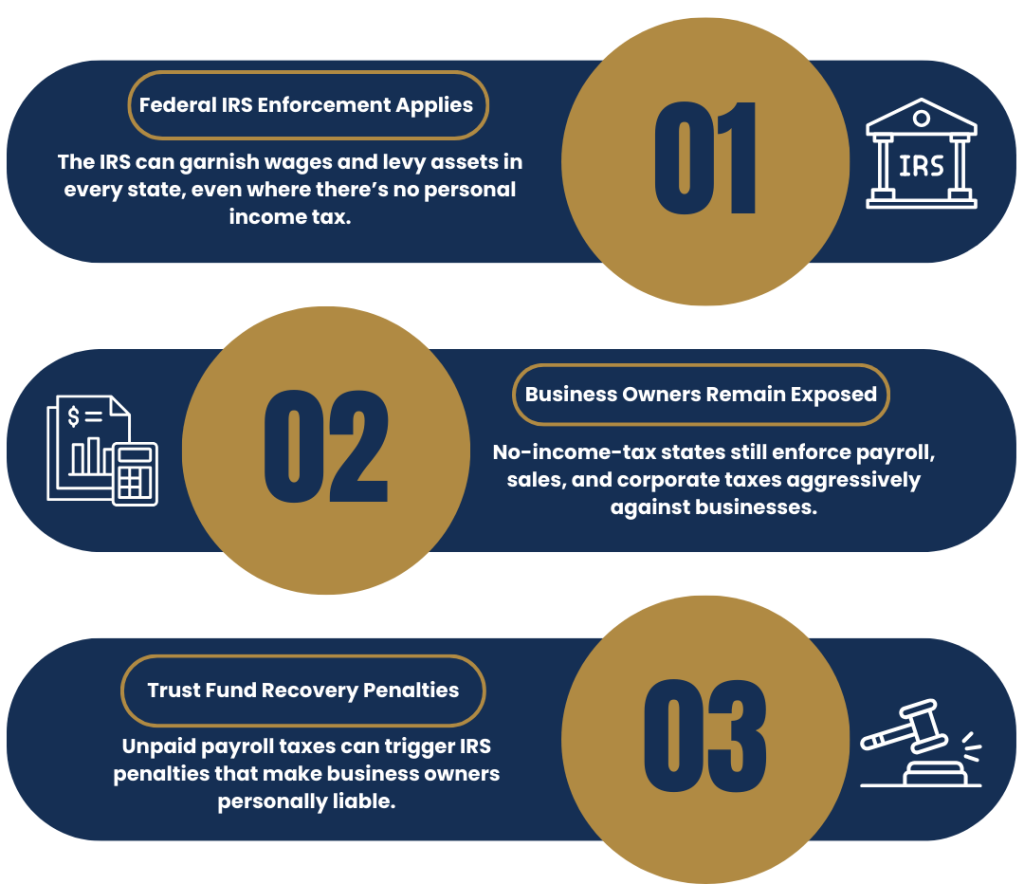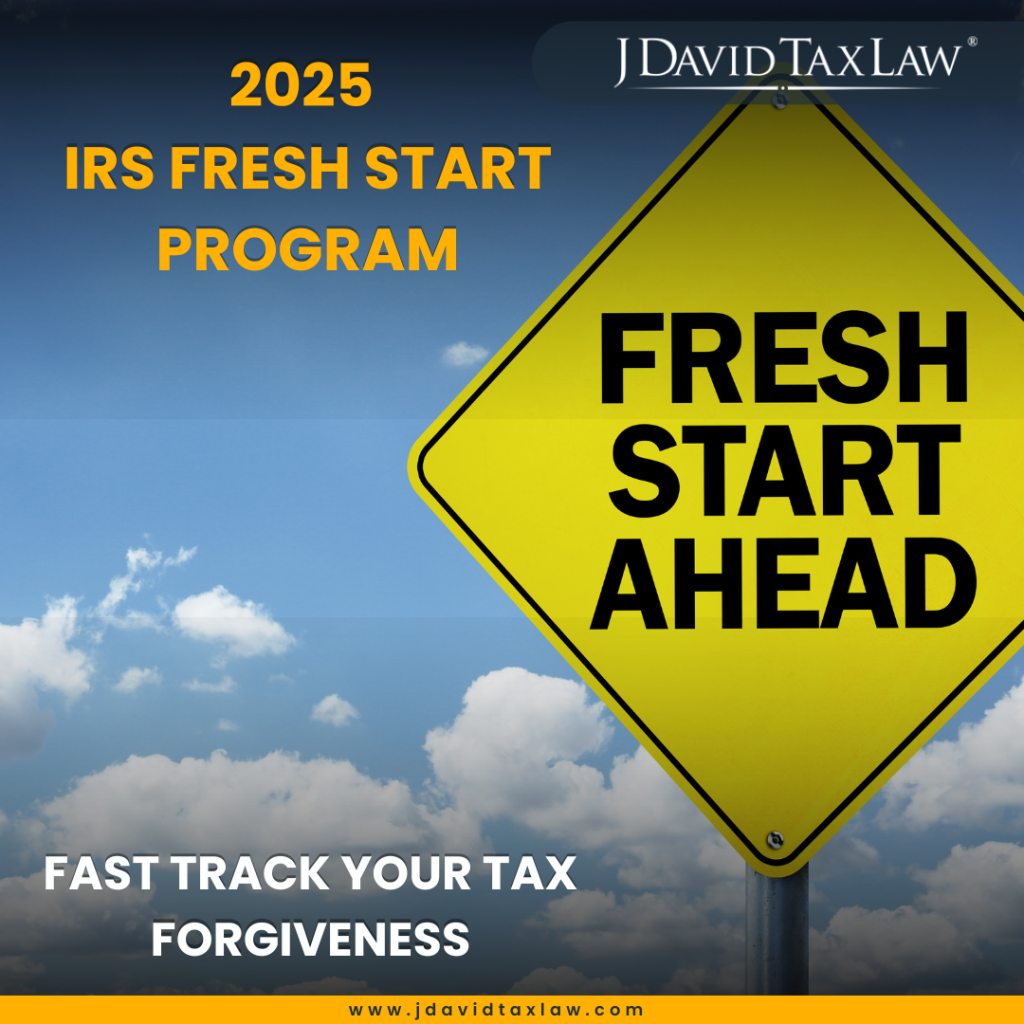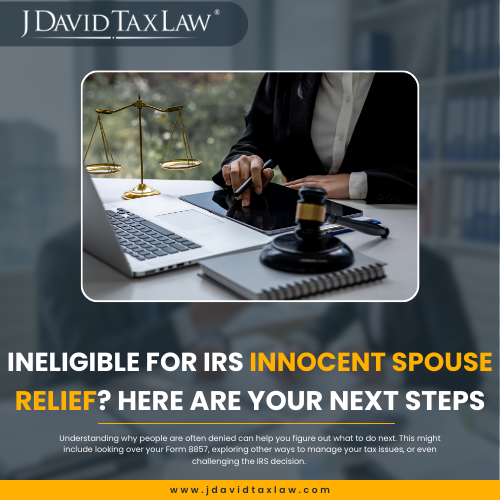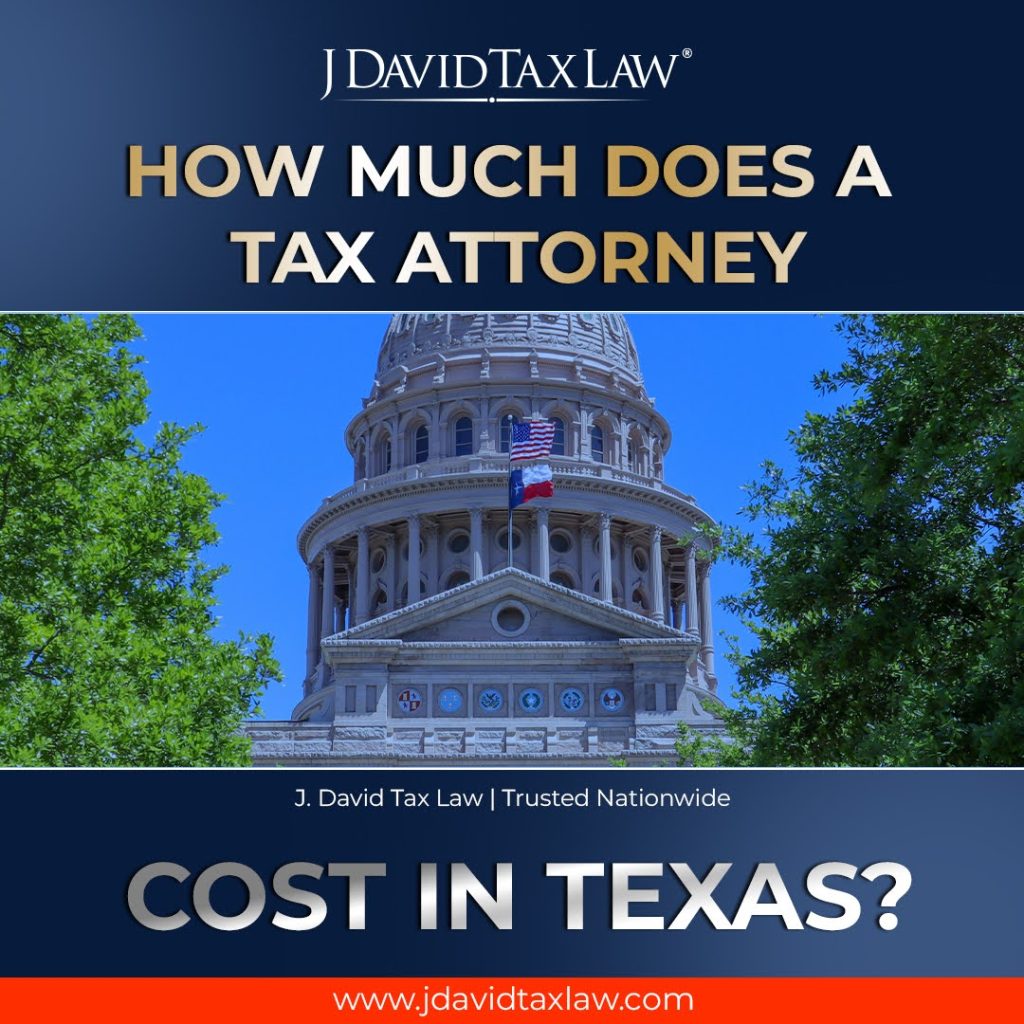Tax debt is not evenly spread across the country. Every year, millions of Americans fall behind on federal or state tax obligations, and some states see higher rates of unpaid taxes than others. In 2025, the IRS reports that taxpayers in certain regions are carrying the largest burdens of back taxes, often facing aggressive enforcement like liens, levies, and wage garnishments.
At J. David Tax Law, we track these trends closely because where you live can influence how tax debt affects you. Some states have no income tax at all, while others combine high federal and state burdens that make falling behind even more damaging.
Key Takeaways
-
The Top 10 states with the highest tax debt in 2025 are California, New York, Texas, Florida, Illinois, Pennsylvania, New Jersey, Massachusetts, Ohio, and Virginia.
-
These states rank highest due to factors such as state income tax burdens, large populations, business tax exposure, and aggressive enforcement agencies.
-
No-income-tax states like Florida and Texas are not exempt, as IRS collections and business-related taxes still create heavy debt.
-
Falling behind on taxes can lead to liens, levies, garnishments, asset seizures, and rapidly compounding penalties across all states.
Defining Tax Debt: Federal and State Enforcement
Tax debt is not a simple matter of “owing the IRS.” It is a legal obligation that can arise at both the federal and state levels, each with its own rules and enforcement powers. Understanding this distinction is critical for any taxpayer facing collection pressure.
Federal Tax Debt (IRS)
The IRS pursues unpaid income, payroll, and business taxes with powerful tools such as liens, levies, wage garnishments, and asset seizures. In FY 2024, the agency collected more than $120 billion in delinquent assessments through these enforcement actions.
State Tax Debt
Depending on where you live, you may also face liability for unpaid state income, payroll, or business taxes. States like California, New York, and Illinois are especially aggressive, often moving faster than the IRS to garnish wages or place liens.
Dual Exposure
Many taxpayers face both federal and state tax debt simultaneously. This “two-front battle” can double the pressure, since IRS and state agencies do not coordinate their enforcement — meaning a taxpayer can face a federal levy and a state garnishment at the same time.
At J. David Tax Law, our tax debt attorneys specialize in handling both IRS and state tax debt, providing clients with unified defense strategies that protect assets, wages, and businesses nationwide.
The IRS is Forgiving Millions Each Day. You Could Be Next.
Top 10 States Under the Heaviest Burden
1. California
The Highest Collections and the Toughest Enforcer
California taxpayers face some of the highest state income tax rates in the country. The Franchise Tax Board (FTB) is widely regarded as the most aggressive state tax agency, with the power to garnish wages, levy bank accounts, intercept professional licenses, and even block state-issued permits. Combined with a high cost of living, many residents fall behind on both IRS and FTB obligations, creating overwhelming tax debt.
If you’re facing an FTB lien or wage garnishment in California, our tax debt attorneys can intervene before your income or professional license is seized.
2. New York
Dual Burden from State and Federal Authorities
New York’s Department of Taxation and Finance (DTF) enforces some of the steepest income tax obligations in the nation. On top of that, New York shares enforcement data with the IRS, meaning taxpayers often face simultaneous collection actions from both agencies. High incomes concentrated in New York City make even small mistakes costly when audits or adjustments occur.
If you’re in New York and facing both IRS and DTF collections, call our New York tax attorneys who can build a coordinated defense to protect your wages and assets.
3. Texas
No Income Tax, But Heavy Federal and Payroll Debt
Texas does not impose personal income tax, but taxpayers are far from immune. The state enforces sales, franchise, and payroll taxes, while the IRS aggressively collects federal income tax. Business owners are particularly vulnerable, as payroll tax liabilities can trigger Trust Fund Recovery Penalties that make individuals personally responsible for company debts.
If you’re a Texas business owner facing payroll or franchise tax penalties, J. David Tax Law can protect your personal finances from state and IRS enforcement. We have offices in Austin, Dallas, Houston and San Antonio.
4. Illinois
State Income Tax and Aggressive Department of Revenue
Illinois combines a flat state income tax with tough enforcement by the Department of Revenue (IDOR). Residents often deal with overlapping IRS and state debt, while businesses face audits and penalties tied to sales and payroll tax obligations. Illinois is also known for steep interest charges that cause debts to balloon quickly.
5. Florida
IRS Enforcement in a No-Income-Tax State
Florida does not levy personal income tax, but the state is a hotspot for federal IRS collections. High numbers of retirees, contractors, and small businesses mean underpayment issues are common. The Florida Department of Revenue is also strict with corporate income tax and sales tax, making business owners frequent targets of garnishments and liens.
J. David Tax Law can stop collections and defend your case. With offices in Jacksonville, Miami, Tampa and Orlando, our tax attorneys provide immediate and local representation.
6. Pennsylvania
State and Local Tax Overlap
Pennsylvania is unique in requiring both state and local income taxes. Taxpayers often fall behind when there are incomplete filings across multiple jurisdictions. The Pennsylvania Department of Revenue enforces the law aggressively, using wage garnishments and liens. Combined with IRS obligations, taxpayers here often face multiple agencies collecting simultaneously.
7. New Jersey
High Per-Capita Burden and Steep Penalties
New Jersey carries one of the highest per-capita tax burdens in the U.S., with significant personal income taxes and property taxes. The Division of Taxation frequently enforces debt through bank levies and liens, while IRS obligations pile on additional pressure. Penalties and interest in New Jersey accumulate quickly, making it one of the toughest states for delinquent taxpayers.
8. Massachusetts
Progressive Taxes and Frequent Audits
Massachusetts taxpayers contend with a progressive income tax system and one of the highest audit rates in the nation. Business owners face exposure from corporate and payroll taxes, often resulting in dual state and IRS liabilities. The Department of Revenue works closely with the IRS, meaning a state problem can quickly become a federal one.
9. Ohio
Broad Enforcement and Strong IRS Overlap
Ohio’s Department of Taxation aggressively enforces income tax debts with garnishments and liens. Many Ohio taxpayers also carry significant IRS debt, leading to overlapping collection actions. Businesses face additional risks from payroll and sales tax audits, making Ohio a recurring top-10 state for tax debt.
10. Virginia
Expanding Audit and Collection Activity
Virginia taxpayers pay state income taxes, and the Department of Taxation has ramped up both audits and collections in recent years. Business owners in Virginia face particular exposure with withholding and payroll taxes, which can lead to personal liability if not addressed. Combined with IRS enforcement, many Virginians are now under heavier tax pressure than ever before.
Why Certain States Carry the Heaviest Burdens
Not all taxpayers face the same risks when it comes to tax debt. Some states consistently rank higher because of the way their tax systems are structured, the aggressiveness of their collection agencies, and the economic realities of living there.
State Income Tax Pressure
States like California, New York, and Illinois impose significant personal income taxes in addition to federal obligations. Falling behind in these states means owing two powerful tax authorities at once.
Aggressive Enforcement Agencies
State revenue departments such as the California Franchise Tax Board (FTB) and the New York Department of Taxation and Finance (DTF) are known for rapid and uncompromising enforcement. Their actions often include liens, wage garnishments, and bank levies that rival or even exceed IRS efforts.
Population and Economic Scale
Larger states generate more tax assessments simply because they have more taxpayers. California, Texas, and New York lead the nation in total tax collections, which correlates to higher levels of tax debt (Savvy Nomad Tax Stats).
Business and Payroll Exposure
Collection Statutes and Interest
👉 Do you know the statute of limitations on your tax debt? The IRS generally has 10 years to collect, but many states can pursue you longer. Learn how this time limit can impact your case in our blog: How the Statute of Limitations Can Help Tax Debt Relief.
No-Income-Tax States Are Not Immune
It’s a common misconception that living in a state without personal income tax — like Alaska or Texas — protects you from serious tax debt. The reality is far different.

The Real Cost of Falling Behind on Taxes
Falling behind on taxes is not just a financial mistake — it is a legal problem with serious consequences. Unlike traditional creditors, the IRS and state tax authorities have unique enforcement powers granted by law. They do not need to take you to court to garnish your wages, seize your bank accounts, or place liens on your property. Once you are in their collection system, every paycheck, bank deposit, and asset you own can be at risk.
| Consequence | What It Means for Taxpayers |
|---|---|
| Wage Garnishments | The IRS can take up to 25% of disposable income, and some states garnish even more — leaving families unable to cover rent, food, and daily living expenses. |
| Bank Levies | Tax authorities can freeze and withdraw funds directly from your bank account with little or no notice, cutting off access to your own money. |
| Tax Liens | Federal and state liens attach to your property, blocking refinancing or sales and clouding your long-term financial stability. |
| Asset Seizures | In severe cases, agencies can seize vehicles, business assets, and even homes to satisfy unpaid tax balances. |
| Penalties and Interest | Balances grow rapidly as penalties and interest compound, turning small debts into overwhelming burdens. Some states allow interest to accrue indefinitely. |
Living in a High-Debt State Puts You at Greater Risk
The data is clear — in 2025, taxpayers in states like California, New York, Texas, Florida, and Illinois face some of the highest levels of tax debt in the nation. Whether the burden comes from state income taxes, business payroll obligations, or federal IRS enforcement, the risks are the same: liens, levies, garnishments, and rapidly compounding penalties.
At J. David Tax Law, we stop garnishments, levies, and liens fast, often within 48 hours, and negotiate lasting solutions that protect your income, property, and business. Call (888) 342-9436 today for a free consultation with a licensed tax attorney.
Frequently Asked Questions
Which state has the highest tax burden in the U.S.?
Who owes the most taxes in the United States?
Tax debt is spread across individuals and businesses, but the largest amounts are typically owed by taxpayers in high-population, high-tax states such as California, New York, Texas, and Florida. Many cases involve both federal IRS debt and state-level liabilities.
What are the best and worst tax states?
“Best” and “worst” tax states depend on how you measure. States like Florida, Texas, and Nevada are often considered the best for individuals because they have no personal income tax. On the other hand, California, New York, and New Jersey are among the worst for taxpayers due to high state income taxes, cost of living, and strict enforcement.
Can tax debt be forgiven?
Yes, in some cases tax debt can be reduced or forgiven through programs like the IRS Offer in Compromise (OIC), which allows qualifying taxpayers to settle their debt for less than the full amount owed. However, approval is strict, and working with an experienced tax attorney significantly increases your chances of success.
How long can the IRS collect back taxes?
The IRS generally has 10 years from the date of assessment to collect unpaid taxes, a period known as the Collection Statute Expiration Date (CSED). Some actions, like filing bankruptcy or entering into certain agreements, can extend this window, which is why legal guidance is critical.



















